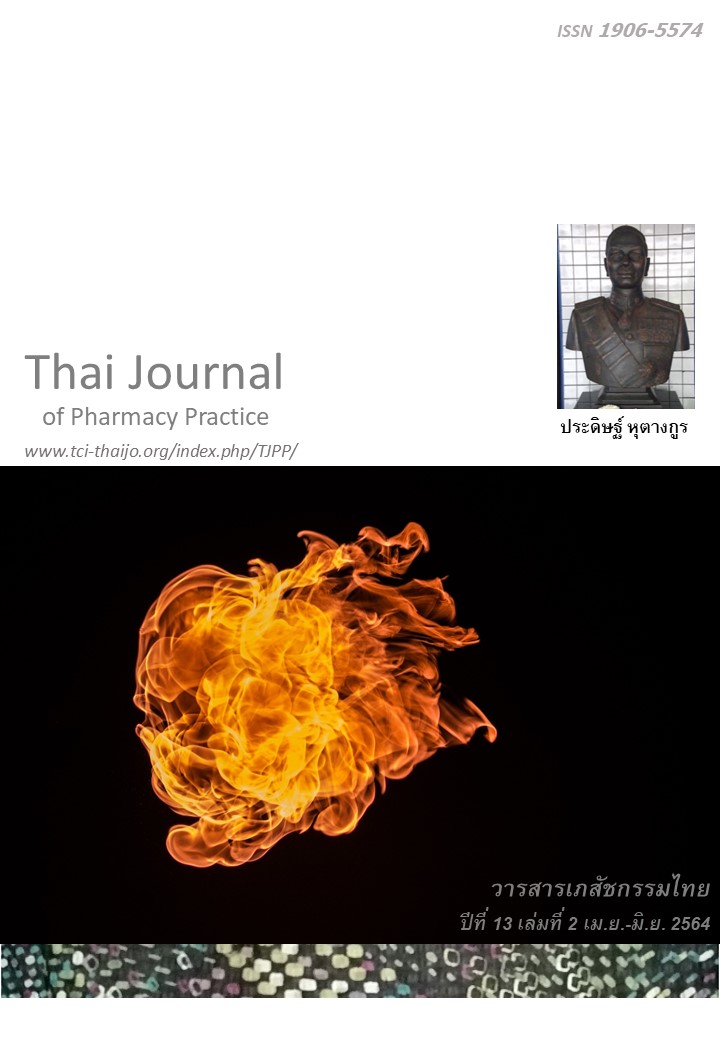ความคลาดเคลื่อนทางยาและผลลัพธ์ทางคลินิกในผู้ป่วยที่ได้รับยาเคมีบำบัดของ โรงพยาบาลระดับตติยภูมิแห่งหนึ่ง: การศึกษาเชิงพรรณนาแบบย้อนหลัง
Main Article Content
บทคัดย่อ
วัตถุประสงค์: เพื่อหาความชุก ลักษณะ และระดับความรุนแรงในการเกิดความคลาดเคลื่อนทางยา (medication error: MEs) จากการใช้ยาเคมีบำบัด และผลลัพธ์ทางคลินิกที่เกิดขึ้นในผู้ป่วยที่ได้รับการรักษา ณ โรงพยาบาลระดับตติยภูมิแห่งหนึ่ง วิธีการ: การศึกษาข้อมูลย้อนหลังเชิงพรรณนาครั้งนี้เก็บข้อมูลจากเวชระเบียน ใบสั่งเตรียมยาเคมีบำบัด เอกสารการเตรียมยา และรายงานความคลาดเคลื่อนทางยา การเก็บข้อมูลเริ่มตั้งแต่ 1 มกราคม พ.ศ. 2559 จนได้ใบสั่งยาครบจำนวน 2014 ใบ ผลการวิจัย: พบ MEs ใน 175 ใบสั่ง (ร้อยละ 8.70) โดยพบ MEs จากขั้นตอนการเตรียมยามากที่สุด (ร้อยละ 4.60) รองลงมา คือ MEs จากการสั่งใช้ยา (ร้อยละ 2.20) และ MEs จากการคัดลอกคำสั่งใช้ยา (ร้อยละ 1.90) ตามลำดับ ระดับความรุนแรงของ MEs ส่วนใหญ่เป็นระดับ B (163 ใบสั่งหรือร้อยละ 8.10) ระดับ C จำนวน 10 ใบสั่ง (ร้อยละ 0.50) และระดับ D จำนวน 2 ใบสั่ง (ร้อยละ 0.10) การศึกษาพบใบสั่ง 2 ใบที่ผู้ป่วยได้รับยา oxaliplatin โดยมีประวัติเคยเกิดภาวะภูมิไวเกิน แต่ไม่ได้รับการสั่งยาป้องกัน ทำให้เกิดภาวะภูมิไวเกินซ้ำ นอกจากนี้ยังพบใบสั่ง 6 ใบที่ผู้ป่วยที่ได้รับยาเคมีบำบัดร่วมกับยาวาร์ฟาริน ทำให้มีค่า INR เพิ่มสูงขึ้นกว่าช่วงเป้าหมาย แต่ไม่พบรายงานการเกิดภาวะเลือดออกผิดปกติ การศึกษานี้ไม่พบผู้ป่วยที่เกิดภาวะกดไขกระดูกจาก MEs ที่ทำให้ขนาดยาสูงเกินไป สรุป: MEs ส่วนใหญ่เกิดจากขั้นตอนการเตรียมยามากที่สุด การพัฒนาระบบการสั่งใช้และเตรียมยาเคมีบำบัดโดยใช้เทคโนโลยีสารสนเทศ จะช่วยลด MEs ลงได้
Article Details
ผลการวิจัยและความคิดเห็นที่ปรากฏในบทความถือเป็นความคิดเห็นและอยู่ในความรับผิดชอบของผู้นิพนธ์ มิใช่ความเห็นหรือความรับผิดชอบของกองบรรณาธิการ หรือคณะเภสัชศาสตร์ มหาวิทยาลัยสงขลานครินทร์ ทั้งนี้ไม่รวมความผิดพลาดอันเกิดจากการพิมพ์ บทความที่ได้รับการเผยแพร่โดยวารสารเภสัชกรรมไทยถือเป็นสิทธิ์ของวารสารฯ
เอกสารอ้างอิง
Pourrat X, Antier D, Crenn I, Calais G, Jonville-Bera A-P, Rouleau A. A prescription and administration error of cisplatin: a case report. Pharm World Sci 2004; 26: 64-5.
Ashokkumar R, Srinivasamurthy S, Kelly JJ, Howard SC, Parasuraman S, Uppugunduri CS. Frequency of chemotherapy medication errors: A systematic review. J Pharmacol Pharmacother 2018; 9: 86-91.
Ranchon F, Salles G, Späth H-M, Schwiertz V, Vantard N, Parat S, et al. Chemotherapeutic errors in hospitalised cancer patients: attributable damage and extra costs. BMC cancer. 2011; 11: 478-87.
Meisenberg BR, Wright RR, Brady-Copertino CJ. Reduction in chemotherapy order errors with computerized physician order entry. J Oncol Pract. 2014; 10: e5-e9.
Marzal-Alfaro M, Rodriguez-Gonzalez CG, Escudero-Vilaplana V, et al. Risks and medication errors analysis to evaluate the impact of a chemotherapy compounding workflow management system on cancer patients' safety. Health Informatics J. 2020; 26: 1995-2010.
National Coordinating Council for Medication Error Reporting and Prevention. NCC MERP index for categorizing medication errors [online] 2016. [cited Jan 25, 2019]. Available from: www.nccmerp.org/ sites/default/files/in dexBW2001-06-12.pdf
Tatro DS. Drug interaction facts 2015. St. Louis, MO: Wolters Kluwer Health; 2014.
Saransate R. Systematic approach to prevent chemotherapy medication errors in Songklanaga rind Hospital. Songklanagarind Medical Journal. 2009; 27: 415-27.
Choorassamee J. Medication errors and adverse drug events in patients receiving antineoplastic agents. Thai Journal of Pharmacy Practice 2019; 11: 744-53.
Boulanger J, Boursiquot J, Cournoyer G, Lemieux J, Masse M, Almanric K, et al. Management of hypersensitivity to platinum-and taxane-based chemotherapy: CEPO review and clinical recom mendations. Curr Oncol 2014; 21: 630-41.
Rosello S, Blasco I, Garcia Fabregat L, Cervantes A, Jordan K. Management of infusion reactions to systemic anticancer therapy: ESMO clinical practice guidelines. Ann Oncol. 2017; 28: iv100-iv118.
Fyhr A, Akselsson R. Characteristics of medication errors with parenteral cytotoxic drugs. Eur J Cancer Care. 2012; 21: 606-13.
Markert A, Thierry V, Kleber M, Behrens M, Engelhardt M. Chemotherapy safety and severe adverse events in cancer patients: strategies to efficiently avoid chemotherapy errors in in- and outpatient treatment. Int J Cancer. 2009; 124: 722-8.
Mouzon A, Kerger J, D’Hondt L, Spinewine A. Potential interactions with anticancer agents: A cross-sectional study. Chemotherapy. 2013; 59: 85-92.
Riechelmann RP, Del Giglio A. Drug interactions in oncology: how common are they: Ann Oncol 2009; 20: 1907-12


